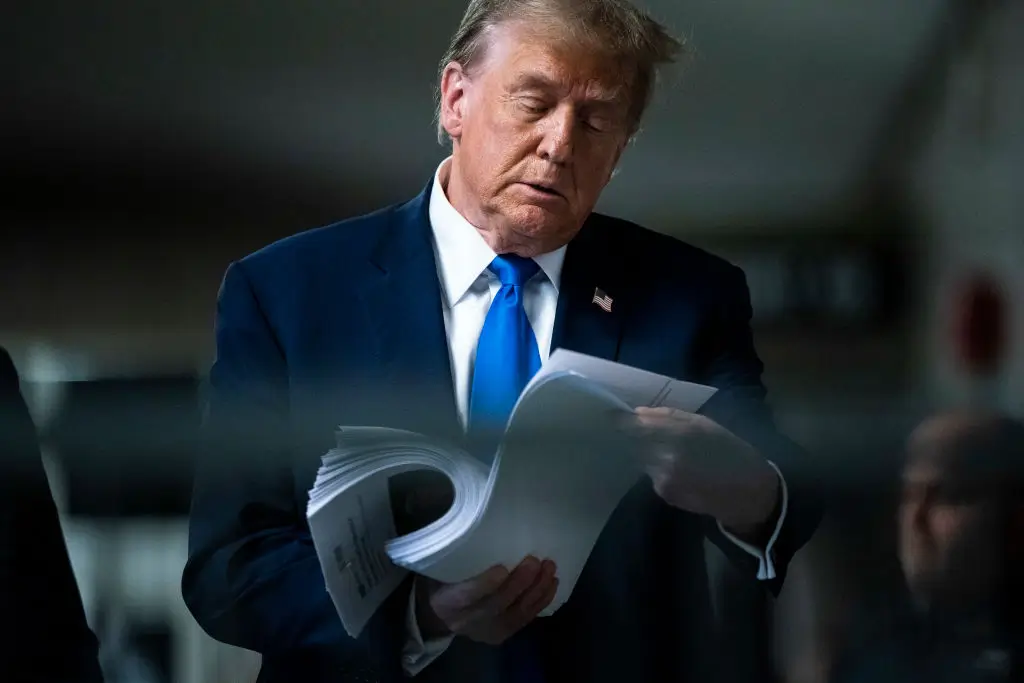Donald Trump’s Lawyers In Hush Money Trial Sought Out Black Male Jurors Who Might Be Sympathetic to the Former President. Here’s Why.
Jury selection is currently underway as Donald Trump prepares for his first-ever criminal trial.
The former president will be tried in New York for allegedly falsifying business records to pay adult film star Stormy Daniels to keep quiet about their alleged affair.
Twelve jurors have already been selected as prosecutors and Trump’s lawyers work diligently to find six alternatives before the trial’s start date on Monday.
Trump’s defense attorneys have spent the past week combing through prospective jurors’ social media accounts to determine any bias for or against the former president. Of the seven men and five women who were seated as jury members, none showed any strong views about Trump or hardline political ties and affiliations on their social accounts.
One juror from lives on the Upper East Side and works in the legal field said he has “political views as to the Trump presidency,” but didn’t agree with all of his policies, according to the The New York Times.
Early on the Times also reported that Trump’s legal team were keeping an eye out for sympathetic jurors, mainly among young Black men and working-class white men.
Much of the former president’s voter base is made up of white, blue-collar voters, but in recent years, his support among Black male voters has increased.
A New York Times/Siena College poll from February surveyed 980 registered voters and found that 23 percent of Black voters would vote for Trump in the upcoming general election. That’s up 1 percent from the same poll that was conducted in October. In the 2016 presidential election, Trump received 8 percent of the Black vote, which increased to 12 percent in the 2020 election he lost. During that election cycle, he won 19 percent of votes cast by Black men.
Even though Trump is seeing incremental increases in Black voter support, the majority of Black voters still back President Joe Biden. A NBC News poll from January found that 75 percent of Black voters would vote for Biden in the 2024 election.
Among the jurors already seated for Trump’s hush money trial, a majority of them have a college degree or higher education. Two of the male jurors are lawyers, one works in finance and another is an engineer.
So far, it’s hasn’t been revealed in any young Black men are on the jury. One has been identified as a Black woman who is an English teacher in a public charter school system.
According to CNN, she said she tries to avoid political conversations and isn’t an avid television news watcher. However, she did express some appreciation for Trump’s frank and outspoken character: “President Trump speaks his mind and I’d rather that than someone who’s in office who you don’t know what they’re thinking.”
Another female juror works in an education setting as a speech therapist while works in technology and one other has a doctorate in physical therapy.
Judge Juan M. Merchan, who’s presiding over the case, said he expects the trial to last about six weeks once every jury member is chosen.
Trump has repeatedly denied having an extramarital affair with Stormy Daniels. In the weeks leading up to the 2016 presidential election, he allegedly directed his then-lawyer Michael Cohen to pay Daniels $130,000 to cover up their romantic ties.
Cohen was the first to face federal charges for hush money payments to Daniels and former Playboy model Karen McDougal, who also claimed to have an affair with Trump. In 2018, Cohen pleaded guilty to campaign finance violations, and several other counts, including tax evasion.
He admitted he arranged the payments “for the benefit of, at the direction of, and in coordination with” Trump and that he was reimbursed by Trump through the Trump Organization. Trump’s lawyers contested that the reimbursements to Cohen were legitimate legal expenses.
Trump was president at the time of Cohen’s conviction, so even though Cohen implicated him in the scheme, he couldn’t be charged per Justice Department policy.
It wasn’t until March 2023 that a grand jury indicted Trump on 34 counts of falsifying business records. If he’s convicted, he faces up to four years in prison.
Trump has three other criminal cases against him — one in Georgia in which he’s accused of meddling in the 2020 presidential election, another in Florida where he allegedly mishandled classified documents, and one more in D.C., which is his federal election interference case connected to the deadly Jan. 6 Capitol insurrection.

